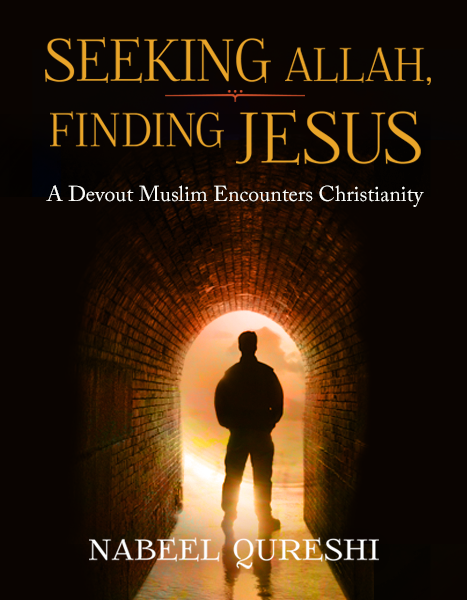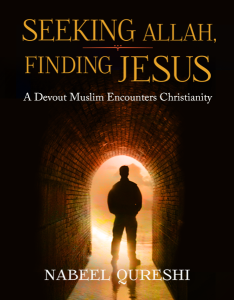During my break from classes, I took time to read the book Seeking Allah, Finding Jesus by Nabeel Qureshi. Qureshi, a former Ahmadi Muslim from Pakistan, in his autobiography, recounts his incredible journey to his faith in Jesus Christ. Qureshi’s book is both emotionally stirring and intellectually stimulating. Qureshi’s acceptance of Christ did not stem from a fiery altar call. Rather, Qureshi’s journey to Christ was an arduous task bursting with anger, passion, and devotion. This book was one that an individual cannot simply lay to the side. Instead, the work compels the reader to finish the work. Qureshi’s book left me with several important thoughts that I had not adequately contemplated, but two impressions branded my soul.
1. The Importance of Christian Love
Something greatly disturbed me with Qureshi’s testimony. It was not the manner in how he came to faith. Rather, the most disturbing element of Qureshi’s testimony is that few Christians really tried to become friends with Qureshi. In fact, God used one man named David to befriend Qureshi and demonstrate Christ’s love to him. Qureshi writes that
“In my case, I knew of no Christian who truly cared about me, no one who had been part of my life through thick and thin. I had plenty of Christian acquaintances, and I’m sure they would have been my friends if I had become a Christian, but that kind of friendship is conditional. There were none that I knew who cared about me unconditionally. Since no Christian cared about me, I did not care about their message” (Qureshi, Seeking Allah, Finding Jesus, 121).
Qureshi’s statement hit me like a ton of bricks. Do we demonstrate conditional love towards those not of the Christian faith where we should demonstrate love of the unconditional kind? Do I? Qureshi notes on several occasions how relationships are central to evangelism. However, Qureshi’s point is not an isolated island, but rather grounded in the clear teachings of Scripture. The apostle John denotes that
“We love because he first loved us. Whoever claims to love God yet hates a brother or sister is a liar. For whoever does not love their brother and sister, whom they have seen, cannot love God, whom they have not seen. And he has given us this command: Anyone who loves God must also love their brother and sister” (1 John 4:19-21).
We cannot truly help others see the truth of God until we first demonstrate the love of God…unconditionally.
2. The High Price of Lordship
Why are many American Christians floundering in their faith? It could be due to the fact that many do not understand the vast importance of Christ’s lordship. Many have adopted the Americanized corpus of Christendom that claims that Christianity requires nothing more than a simple prayer and rewards one with bountiful treasures on earth. Such is a far cry from Jesus’ claim that one “cannot serve both God and money” (Matthew 6:24). Qureshi certainly understands the importance of surrendering to Christ’s lordship. Qureshi writes that “The cost for a Muslim to accept the gospel can be tremendous” (Qureshi, Seeking Allah, Finding Jesus, 251). Qureshi had good parents who loved him deeply and brought him to have a deep love for Islam. In fact, his mother Ammi reminded me of my own mother. Both possess a deep love for their children and for their religious traditions. Qureshi denoted that “I had to give up my life in order to receive His life. This was not some platitude or cliché. The gospel was calling me to die” (Qureshi, Seeking Allah, Finding Jesus, 278). To accept Christ, Qureshi had to come with the understanding that his acceptance of Christ could spell the end of his relationship with his parents and siblings.
Does one understand the importance of a person’s surrender to God? Do I? Are we not consumed with the thought that the world revolves around us? Should we not understand instead that the universe revolves around God? Qureshi came to this important revelation,
“While I was wallowing in self-pity, focused on myself, there was a whole world with literally billions of people who had no idea who God is, how amazing He is, and the wonders He had done for us. Those are the ones who are really suffering” (Qureshi, Seeking Allah, Finding Jesus, 283).
Qureshi had to give up everything to come to Christ. How many individuals sitting in any given pew each Sunday would do the same?
Nabeel Qureshi’s book Seeking Allah, Finding Jesus is a must-read. Qureshi’s testimony challenged me far more than I ever anticipated. In the end, if any person is to be found in Christ, that person must surrender to the lordship of Christ. If any person desires to bring people to faith in Christ, that person must learn the importance of unconditional love. Neither of these attributes is possible without the sovereign help from Almighty God. I am thankful that God demonstrated his love towards me in that “while [I was] still [a] sinner, Christ died for [me]” (Romans 5:8). To God be the glory!
Be sure to read the Nabeel Qureshi’s powerful autobiography Seeking Allah, Finding Jesus found at Amazon and your local bookstores.
Bibliography
All Scripture, unless otherwise noted, comes from the New International Version. Grand Rapids: Biblica, 2011.
Qureshi, Nabeel. Seeking Allah, Finding Jesus: A Devout Muslim Encounters Christianity. Grand Rapids: Zondervan, 2014.
Copyright March 2015. Brian Chilton.






